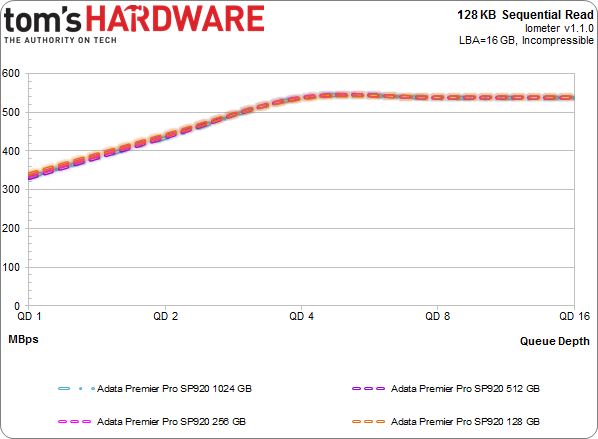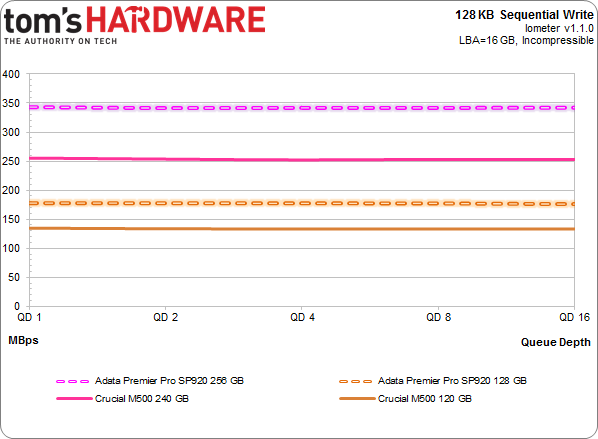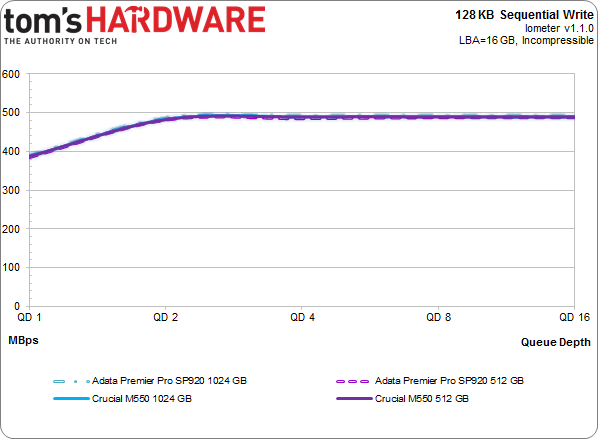Adata Premier Pro SP920 SSD: From 128 To 1024 GB, Reviewed
Adata shifts away from SandForce in its Premier Pro SP920 SSD family. With promises of incredible performance and spiffy features like DevSlp, Adata's latest employs the Marvell controller we saw in Crucial's M550. But the two share quite a bit more...
Results: Sequential Performance
Fantastic sequential read and write performance is a trademark of modern SSDs. To measure it, we use incompressible data over a 16 GB LBA space, and then test at queue depths from one to 16. We're reporting these numbers in binary (where 1 KB equals 1024) instead of decimal numbers (where 1 KB is 1000 bytes). When necessary, we also limit the scale of the chart to enhance readability.
128 KB Sequential Read
As we've seen from some of our recent SSD reviews, performance at low queue depths starts slow, and scales up as outstanding commands pile up. I speculate that our 128 KB sequential workload isn't intense enough to fully saturate Adata's SP920s. Perhaps its an artifact of larger page sizes (16 KB in this case).
All four drives are more or less equal in this test, peaking at almost 540 MB/s at a queue depth of four. I'm using 128 KB chunks of data, whereas a test utility like AS SSD is going to use somewhere in the range of 1 to 4 MB.
128 KB Sequential Write
128/256 GB Adata SP920
I'll start by write testing the two smaller SP920s, and comparing them to the older Crucial M500 equivalents. Why am I dipping back to the 120 and 240 GB M500s? Unfortunately, Crucial didn't send along its 128 and 256 GB models for review, which benefit from twice as many dies as Adata's SSDs. So instead of making this face-off about interleaving, it's instead a measure of firmware and controller performance. Even with the same NAND, we realize a notable speed-up from the two Adata offerings.
Get Tom's Hardware's best news and in-depth reviews, straight to your inbox.
The 128 GB Adata SP920 achieves 177 MB/s, which is quite a bit faster than the 120 GB M500's result in the mid-130 MB/s range. The 256 GB model's jump is even more impressive; it registers an extra 100 MB/s. That's awesome, and very close to Adata's official specification. However, the 256 GB M550 is supposed to achieve 500 MB/s. Those extra dies prove useful in a test like this one.
There is a tradeoff here.
512/1024 GB Adata SP920
The larger models fare far more predictably, and we see total parity between the bigger drives with the same number of dies. Performance that falls just shy of 500 MB/s is a result of Micron's flash and firmware. It's about 100 MB/s more than the M500 delivers, though the real fruits of this platform are found elsewhere.
Here's a breakdown of the maximum observed 128 KB sequential read and write performance with Iometer:
The SP920s fall a few megabytes per second short in our benchmark, which are enough to put Adata's largest two models behind the Crucial M550s at the top. In any case, that small amount of difference is imperceptible.
Current page: Results: Sequential Performance
Prev Page Test Setup And Benchmarks Next Page Results: Random Performance-
cryan Reply13011395 said:I prefer Sandisk, if you don't mind.
The X210 is pretty awesome, but newer Marvell implementations are built with Haswell-style power features in mind. If you're looking for a drive to use in mobile applications, mind the heat and power consumption stats.
Regards,
Christopher Ryan -
rajangel Awhile back I purchased a few different SSD's to test out (OCZ, Crucial, Patriot, Adata). The Adata is the only one still running and was always the quickest. I don't know how this one is built, but the last Adata was built tough. The OCZ was so flimsy it felt like paper. The Crucial and the Patriot were slightly better in build quality. Now that I'm in the market for a new drive I may consider this.Reply -
cryan Reply13012280 said:Awhile back I purchased a few different SSD's to test out (OCZ, Crucial, Patriot, Adata). The Adata is the only one still running and was always the quickest. I don't know how this one is built, but the last Adata was built tough. The OCZ was so flimsy it felt like paper. The Crucial and the Patriot were slightly better in build quality. Now that I'm in the market for a new drive I may consider this.
I have to say, the plastic or metal chassis a drive comes in doesn't mean much. In the lab, I like a nice heavy metal SSD casing, but in a laptop? You probably want a flimsy plastic chassis. It's not conductive and doesn't add much weight.
Regards,
Christopher Ryan -
rajangel It's a matter of opinion. I like things that are built well, and have a quality appearance. I think build quality does affect performance (read reliability). Especially when connectors/etc are cheap in construction. However, just my opinion.Reply -
cryan Reply13012326 said:It's a matter of opinion. I like things that are built well, and have a quality appearance. I think build quality does affect performance (read reliability). Especially when connectors/etc are cheap in construction. However, just my opinion.
I agree that a substantial chassis tends to reinforce the perception of a drive's build quality, but much of the time its aesthetic. The component choice on the PCB speaks more to quality. I've seen some downright terrible drives in the fanciest of cases.
Regards,
Christopher Ryan
-
rajangel I think there should be a restriction that prevents the article author from replying, unless there is a substantial mistake that was noted. I feel like tomshardware authors troll their own threads. This has become a problem lately. I'm at the point where I feel my business and time would be better spent on a real tech website. Tomshardware is like the Yahoo of tech sites lately.Reply -
iltamies Typo on last page: "Adata gets a solid product able to soften the wait, and Micron (Crucial's parent company) gets to more more volume." should read "move more volume."Reply -
Wisecracker Impressive ... power consumption is a bit high though, compared to the Samsung 120GB Evo (my current $80 fav)Reply
Are 'microseconds' considered 'milliseconds' ??



